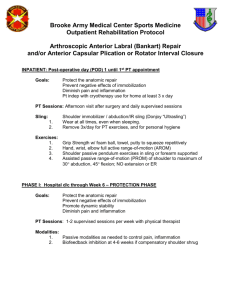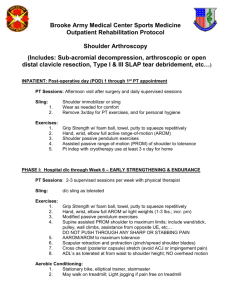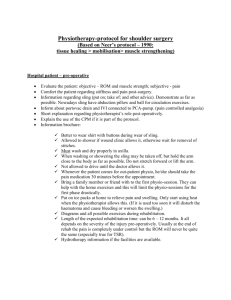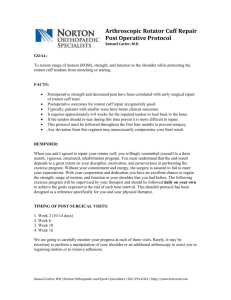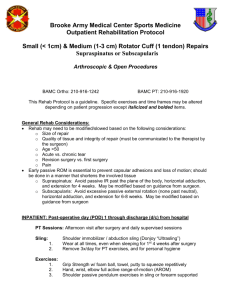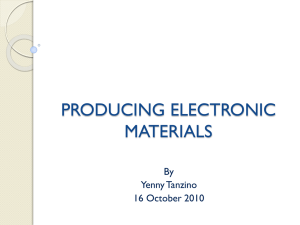orthopedic surgery and physical therapy
advertisement
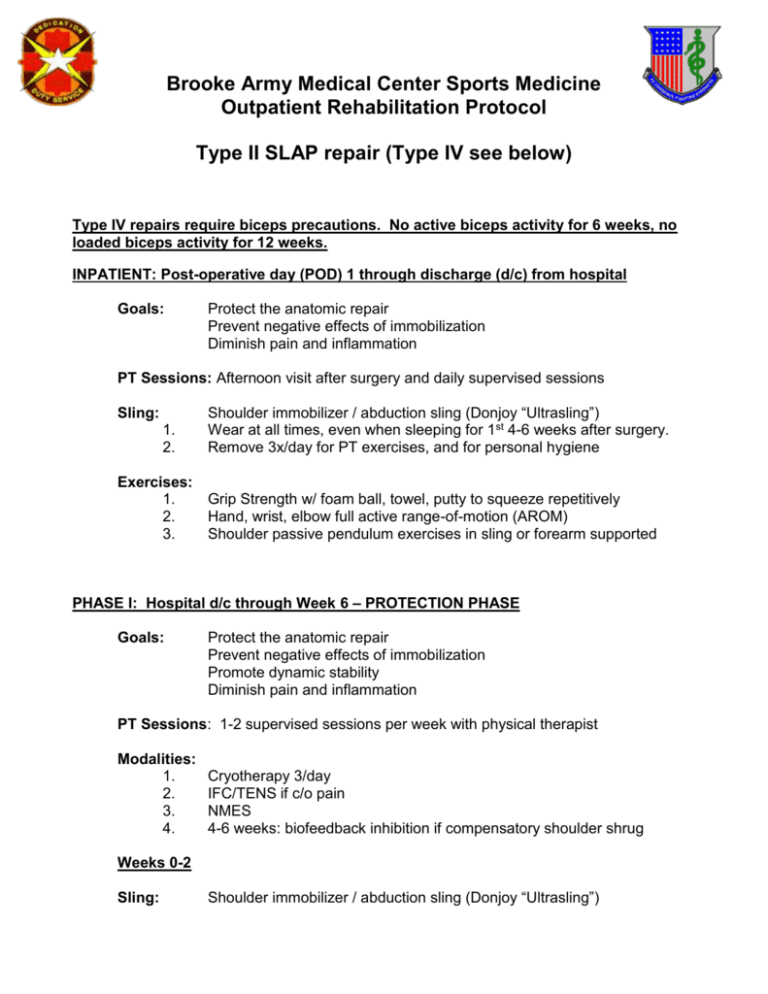
Brooke Army Medical Center Sports Medicine Outpatient Rehabilitation Protocol Type II SLAP repair (Type IV see below) Type IV repairs require biceps precautions. No active biceps activity for 6 weeks, no loaded biceps activity for 12 weeks. INPATIENT: Post-operative day (POD) 1 through discharge (d/c) from hospital Goals: Protect the anatomic repair Prevent negative effects of immobilization Diminish pain and inflammation PT Sessions: Afternoon visit after surgery and daily supervised sessions Sling: 1. 2. Exercises: 1. 2. 3. Shoulder immobilizer / abduction sling (Donjoy “Ultrasling”) Wear at all times, even when sleeping for 1st 4-6 weeks after surgery. Remove 3x/day for PT exercises, and for personal hygiene Grip Strength w/ foam ball, towel, putty to squeeze repetitively Hand, wrist, elbow full active range-of-motion (AROM) Shoulder passive pendulum exercises in sling or forearm supported PHASE I: Hospital d/c through Week 6 – PROTECTION PHASE Goals: Protect the anatomic repair Prevent negative effects of immobilization Promote dynamic stability Diminish pain and inflammation PT Sessions: 1-2 supervised sessions per week with physical therapist Modalities: 1. 2. 3. 4. Cryotherapy 3/day IFC/TENS if c/o pain NMES 4-6 weeks: biofeedback inhibition if compensatory shoulder shrug Weeks 0-2 Sling: Shoulder immobilizer / abduction sling (Donjoy “Ultrasling”) 1. 2. 3. Sling for 4-6 weeks. Wear immobilizer when sleeping for 4-6 weeks after surgery. Remove sling 3x/day for home PT exercises, and for personal hygiene Exercises: Shoulder passive pendulum exercises in sling or forearm supported Scapular retraction; gently pinch shoulder blades together for 5 sec Cryotherapy, modalities as indicated **No active Flexion, ER, Extension, or Abduction. No resistance to elbow flexion or supination for 6 weeks Aerobic Conditioning: may ride stationary bike while wearing immobilizer Weeks 3-4 Sling: Exercises: 1. 2. 3. 3. 4. 5. 6. 7. Discontinue use of sling, immobilizer at 4 weeks Slowly advance PROM; add light AAROM exercises with goal of: a. Flexion to >90 deg b. Abd to 75-85 deg c. ER in scapular plane to 25-30 deg (watch for sharp pain with ext rotation) d. IR in scapular plane to 55-60 deg No active Flexion, Extension or abduction No resistance to elbow flexion or supination for 6 weeks Initiate rhythmic stabilization drills Initiate proprioception training (no axial loading or CKC exercises x 8 weeks) Tubing ER/IR at side Continue Isometrics Continue use of cryotherapy Weeks 5-6: Exercises: 1. Gradually improve ROM a. Flexion to 145 deg b. ER at 45 deg abduction: 45-50 deg c. IR at 45 deg abduction: 55-60 deg d. Initiate light IR/ER at 90 deg abduction 2. Initiate gentle, global shoulder stretching 3. Continue tubing IR/ER at side 4. PNF manual resistance 5. Initiate Active shoulder abduction (w/o resistance) 6. Initiate full can exercise (w/o resistance) 7. Initiate Prone rowing, Prone horizontal abduction 8. No biceps strengthening PHASE II: Weeks 7-14 – MODERATE PROTECTION PHASE/EARLY STRENGTHENING GOALS: Gradually restore full ROM (week 10) Preserve the integrity of the surgical repair Restore muscular strength and balance PT Sessions: 2-3 supervised sessions per week with physical therapist Modalities: 1. 2. 3. 4. Cryotherapy prn IFC prn NMES Biofeedback inhibition if compensatory shoulder shrug Weeks 7-9: Exercises: 1. Gradually progress ROM with goals of: a. Flexion to 180 deg b. ER at 90 degrees abduction: 90-95 deg c. IR at 90 deg abd: 70-75 deg 2. Strength a. Continue to progress isotonic/theraband strengthening program b. Continue PNF strengthening c. Initiate Throwers 10 program d. Isokinetic IR/ER at 30/30/30 at 180, 300 deg/sec 3. Proprioception: a. Rhythmic stabilization b. OKC, CKC perturbation training Aerobic Conditioning: Stationary bike or treadmill walking Weeks 10-12: Exercises: 1. Progress to full functional AROM and stretching a. Progress ER to thrower’s motion b. ER at 90 deg abduction (110-115 in throwers) 2. May initiate slightly more aggressive strengthening a. Begin light serratus punches b. Begin light chest press c. Continue theraband, Thrower’s Ten d. Isokinetic training 30/30/30 3. Proprioception a. Rhythmic stabilization b. Perturbation training Criteria for progression to Phase III: 1. 2. 3. 4. Full non-painful ROM Satisfactory stability Muscular strength (Grade IV MMT or better) No pain or tenderness PHASE III: Weeks 13-20 – MINIMAL PROTECTION PHASE / ADVANCED STRENGTHENING & ENDURANCE Goals: Establish and maintain full ROM Improve muscular strength, power, and endurance Gradually initiate functional activities PT Sessions: 1-3 supervised sessions per week with physical therapist Weeks 13-16: Exercises: 1. Continue capsular stretches 2. Continue strengthening exercises (may begin axial loading): a. Thrower’s Ten Program b. PNF manual resistance c. Endurance training d. Initiate light plyometric program e. Restricted sport activities (light swimming, half golf swings) f. Push-up progression (wall, on knees) Weeks 17-20: Exercises: 1. Continue all exercises listed above 2. Continue all stretching 3. Continue Thrower’s Ten program 4. Continue plyometric program 5. Initiate interval sport program (throwing, etc) 6. Progress from knee to military push-ups; AVOID anterior capsule stretching by not dropping below the scapular plane during each rep 7. Begin isokinetic training (IR/ER) Aerobic Conditioning: 1. May begin jogging in addition to bike, elliptical trainer, and stairmaster 2. Upper body cycle up to 10-15 min forward and 10-15 min backward Isokinetic Testing: ER/IR (30/30/30 or 90/90 if overhead athlete or laborer) Criteria for Progression to PHASE IV: 1. Full, painfree AROM 2. Satisfactory static stability (MMT 4+/5) or isokinetic testing 75-80% of uninvolved side 3. No pain or tenderness PHASE IV: Weeks 20-26 – ADVANCED STRENGTHENING PHASE Goals: Enhanced muscular strength, power, and endurance Progress functional activities Maintain shoulder mobility PT Sessions: 1-2 supervised sessions per week with physical therapist Exercises: 4. Continue flexibility exercises 5. Continue isotonic strengthening program 6. PNF manual resistance patterns 7. Plyometric strengthening 8. Progress interval sport programs 9. Continue military push-up progression 10. Isokinetic training ER/IR 11. Gradually increase weight training to maximum; must be pain free 12. Advanced pool therapy if available Isokinetic Testing: ER/IR (30/30/30 or 90/90 if overhead athlete or laborer) Aerobic Conditioning: 1. Progress from jogging to running; should be painfree Criteria for Progression to PHASE V: 1. Full or nearly full shoulder AROM 2. Near full strength per manual muscle testing (or 80% isokinetic testing) 3. Pain-free basic functional training exercises PHASE V: Months 6-9 – RETURN TO FULL DUTY/ACTIVITY Goals: Exercises: 1. 2. Gradual return to sport activities Maintain strength, mobility, and stability Full AROM equal to opposite UE (accept 5-10 loss of ER) Full shoulder strength per manual testing (or 90% isokinetic testing) Able to pass APFT, including push-ups Gradually progress sport activities to unrestrictive participation Continue stretching and strengthening program _______________________________ ______________________________ MARK BAGG, MD COL, MC Chief, Orthopedics KATHLEEN ZURAWEL COL, SP Chief, Physical Therapy APPROVE / DISAPPROVE APPROVE / DISAPPROVE Updated 24 June 2005
